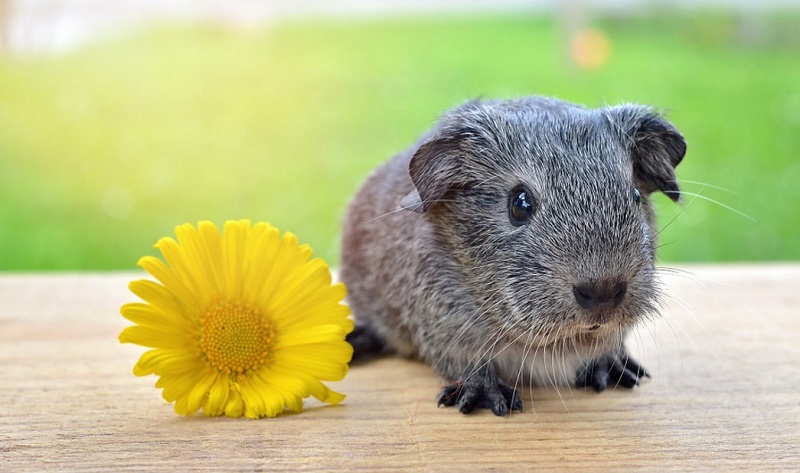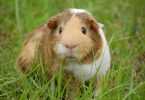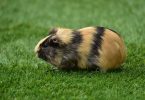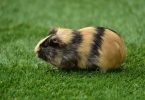Doctor Doolittle famously talked to the animals. What pet owner wouldn’t want that ability? To be able to converse with your pet in a common tongue, to ask how their day was, for them to be able to immediately make you aware of any problem, pain or suffering they were feeling, this is the stuff pet owner dreams are made. It would certainly change the dynamic of the relationship for the better in all sorts of ways. Unfortunately for us all, this is still just a pipe dream (who knows where technology make take us in the future), only to be found in the pages of science fiction novels or Hollywood movies. Whatever pet you have chosen, it is important to have a grasp of the sounds they make and what they mean and guinea pigs are no different. Guinea pig sounds are surprisingly diverse and worth some time and attention to increase your understanding and help you to make the most of your relationship with these adorable creatures.
With no two-way communication possible, it is very useful to have a basic comprehension of the noises your pet guinea pig may make. Scientists have spent time recording and analyzing the sounds guinea pigs make so you can be better informed of what the different sounds mean. By recognizing these sounds, you will be better placed to respond more accurately to their needs. The tongue in cheek song, ‘The Fox (What Does The Fox Say?)’ asked us to consider the sounds foxes make, but here we will concentrate on guinea pigs!
Guinea pigs are very noisy animals, enjoying social interaction and their sounds are surprisingly wide ranging. They will make noises on their own (just as you may talk to yourself, or sing in the shower), they will make noises to communicate with other guinea pigs, and use sounds to attempt to relay to humans any fears or happiness they may be experiencing at that moment.
Obviously the actual sound emitted varies from guinea pig to guinea pig depending upon size and breed, but here are the main noises they make, what they should sound like and a guide to assist in interpreting what they actually mean. Get to know your guinea pig and its noises and you are half way there to a happy and healthy little piggy.
Different Guinea Pig Sounds
Wheeking
The ‘wheek’ noise sounds exactly like it is spelled (onomatopoeic – like how we may define a sheep noise as ‘Baa’). It is a high pitched squeak and often this is usually the call which means ‘mom, dad, I’m hungry’. If you are approaching with food, you can expect some excited wheeking. Also, if there is a regular time of the day that you tend to feed your guinea pig, you can expect them to be at the noisily wheeking away to remind you it’s dinner time. You can really hear the excitement in the guinea pigs wheek, but that doesn’t mean you should get carried away, it can be enticing to keep feeding and enjoying the gratification of the wheek, but too much food makes Jonny a fat and unhealthy guinea pig!
Interestingly wheeking is learned behavior. It is a noise that is only used by guinea pigs towards humans. As guinea pigs have been domesticated and fed as opposed to scavenging for their food, they have developed this sound. There is evidence that this noise is relative new to the species and was not present before guinea pigs were kept as domestic pets.
Purring
The purr is a deep, low and constant sound. It is a very strange and unique sound, difficult to explain but imagine a much lower pitched cat purr, mixed almost with a frogs ‘ribbit’. It is a noise that is exclusively made by guinea pigs due to the structure of their throats, meaning it cannot be replicated by other animals.
This noise is a general a sign of contentment. All is good in the guinea pig world and they are simply letting you know. Like with a cat, you are most likely to hear this noise when petting or stroking your furry cavy.
Cooing
The coo, is a sound of endearment and soothing. A mother guinea pig will often coo at her children, and your guinea pig may even coo at you if you have spent time nurturing the relationship. It sounds more like the noise you would usually associate with birds, but don’t be alarmed, it is the sound of a happy guinea pig.
Chutting
Another sound that is onomatopoeic (remember the sheep baa). Chutting is a constant repeating of the sound ‘chut’, over and over again.
This is not a universal sound to all guinea pigs, but no-one is quite sure why or how this has come to pass in some guinea pigs and not others. It is not a breed specific thing either, just certain guinea pigs will chut, and others will not.
Again like the purr, it is a noise made by a happy guinea pig. Life is good, they are relaxed and content, probably just had some food, and now they are going to kick back and chut. Because it is expressing similar emotions, sometimes purring and chutting will happen simultaneously, perhaps purrs interspersed with chutting or the other way round.
It may take some time from bringing home a new guinea pig to hearing the chutting sound. They need to feel safe, comfortable and secure in their home environment to produce this noise. Keep their environment clean and well maintained, keep danger away and hopefully they will be chutting away in no time.
Rumbling
Let’s get ready to rumble! The rumble is a very similar to the purr but it resonates at a much lower pitch and has that sound like something is vibrating. This is the noise that guinea pigs make when they are trying to attract a mate. This mating call, is a seduction technique and the cry to the opposite sex – ‘hi there good looking’. The male guinea pig will usually walk around making this sound, but the walk is often more pronounced than usual, a slight swagger in the hips, imagine a man strutting down the high street in his newest clothes.
The sound is not exclusive for the males though; the female guinea pig may also use this rumble sound when in season to highlight to the male guinea pig that she is ready for mating.
Growling
A growling guinea pig is rarely a good sign. Like with most animals, it is a sign of distress, usually fear. Although probably not the most threatening sound in the animal kingdom…, it is their attempt to be intimidating. With guinea pigs it is often combined with some teeth grinding. This is a sign of aggressive behavior and you may be advised to keep your fingers well away from their mouth if you don’t want to get bitten! Assuming in your house, there are no predators or any actual dangers to the guinea pig, it may be a reaction to a change in the food or the environment. Guinea pigs can be very conservative (with a small c) and often do not react well to change.
Squealing
This noise can actually mean a few different things, but is always associated with pain, anguish or feelings of being in immediate danger. This pain can be physical, such as an illness or accident (or quarrelling cavy’s have bitten each other!), but can also signify emotional distress, perhaps if one of the family has died in the living environment. You are most likely to experience this sound if you take your furry friend to the vet. A new environment, and unknown people examining your pet guinea pig will cause fear and distress, especially with needles or thermometers. Regular trips to the vet make your furry friend slightly more comfortable with this environment, but be prepared for both you and your cavy feeling distressed. However unpleasant, routine trips to the vet are highly recommended.
Teeth Chattering
This sound is identified by a number of squeaks released in rapid fashion, often accompanied by a grinding or gnashing of the teeth. This noise is most generally associated with anger or dominance. It is especially common between two males that are living within the same cage, as they attempt to mark out their space and territory. It can often be a precursor to them fighting so try to be vigilant if you hear this noise and perhaps think of removing one cavy from the cage to allow everyone to settle down before reintroducing the guinea pig.
Whining
The classic moan, only slightly higher pitched. This, like when children do it, is to signify unhappiness. It is a way of complaining without words, just a noise that means dissatisfaction. This is a useful sound to know, as it means your guinea pig does not like something you are doing, perhaps you are holding them in an uncomfortable way, or you have interrupted something else they were doing (probably snoozing). Take note of when and why they use this noise to keep your furry friend as happy as can be, and avoid it happening again in the future.
Conclusion
Guinea pigs are surprisingly articulate through their noises. Such a small animal has a wide array of noises that they can produce. Without over simplifying, you can often tell if it sounds like a purr or coo of happiness or whether it is a growl or squeal of distress, simply by natural instinct. The more you grow to understand these noises, the better levels of communication you will have with your guinea pig. This means you are able to respond to their needs in a timelier manner and comfort them if you hear they are distressed. A better understanding makes for a richer relationship and closer bond to the cavy and that is what all guinea pig owners want.
If you are still unsure of your guinea pig’s noises, check out more recorded sounds here. Happy listening!





Very cool article